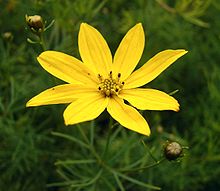| Coreopsis verticillata | |
|---|---|

| |
|
Scientific classification
| |
| Kingdom: | Plantae |
| Clade: | Tracheophytes |
| Clade: | Angiosperms |
| Clade: | Eudicots |
| Clade: | Asterids |
| Order: | Asterales |
| Family: | Asteraceae |
| Genus: | Coreopsis |
| Species: | C. verticillata
|
| Binomial name | |
| Coreopsis verticillata | |
Coreopsis verticillata is a North American species of tickseed in the sunflower family. It is found primarily in the east-central United States, from Maryland south to Georgia, with isolated populations as far west as Oklahoma and as far north as Québec and Ontario. [1] The common names are whorled tickseed, [2] [3] whorled coreopsis, thread-leaved tickseed, thread leaf coreopsis, and pot-of-gold.
Description
Coreopsis verticillata is an herbaceous perennial that grows 2–3 ft (1–1 m) tall and about 2 ft (1 m) wide, although as it spreads laterally by rhizomes, [4] this width can be exceeded. The stems are wiry. [5] The flower heads are up to 2 in (51 mm) across, and both the disc florets and ray florets are bright yellow. The flowers are produced abundantly in clusters from midsummer to fall. [6]
Habitat
Coreopsis verticillata can commonly be found in dry, thin woods and open pinelands, preferring sites with full sun exposure. It can tolerate drought, poor soil, extreme heat, and neglect. [5]
Horticultural cultivation
Coreopsis verticillata and its horticultural cultivars are not difficult to grow and hence make good starter plants for beginning gardeners in the U.S. [7] They have a long flowering season and are relatively free from pests and diseases. [7] They attract butterflies and are deer resistant. [7] They can be grown in hanging baskets and containers (where irrigation will be necessary), or as border plants. [8] Carolyn Singer, in "Deer in My Garden", reports that C. verticillata is a good companion plant with other summer-blooming perennials requiring similar conditions. [9] The following notable cultivars have gained the Royal Horticultural Society's Award of Garden Merit:
- 'Grandiflora' - taller than other cultivars, with slightly larger flowers [10]
- 'Moonbeam' - pale, sulphur-yellow flowers, slightly shorter growth, chosen as the 1992 Perennial Plant of the Year by the Perennial Plant Association. [5] When this cultivar was first introduced to the market, demand outstripped supply in some localities, such was its popularity. [11] [12]
- 'Zagreb' - shorter than the species, bright yellow flowers [13] [14]
References
- ^ Biota of North America Program 2014 county distribution map
- ^ BSBI List 2007 (xls). Botanical Society of Britain and Ireland. Archived from the original (xls) on 2015-06-26. Retrieved 2014-10-17.
- ^ USDA, NRCS (n.d.). "Coreopsis verticillata". The PLANTS Database (plants.usda.gov). Greensboro, North Carolina: National Plant Data Team. Retrieved 17 January 2016.
- ^ "Coreopsis verticillata L." Wildflower Center at The University Of Texas At Austin. Retrieved 2010-02-20.
- ^ a b c Christman, Steve. "Coreopsis verticillata". Floridata. Retrieved 2010-02-20.
- ^ Flora of North America, Coreopsis verticillata Linnaeus, Sp. Pl. 2: 907. 1753.
- ^ a b c "Coreopsis verticillata 'Moonbeam'". Perennial Resource. Archived from the original on 2011-07-15. Retrieved 2010-02-20.
- ^ "Coreopsis verticillata". Magnolia Gardens Nursery. Archived from the original on 2009-05-28. Retrieved 2010-02-20.
- ^ Singer, Carolyn (2006). Deer in My Garden: Vol. 1: Perennials & Subshrubs. Emerald Book. ISBN 978-0-9774251-0-5.
- ^ "RHS Plant Selector Coreopsis verticillata 'Grandiflora' AGM / RHS Gardening". Apps.rhs.org.uk. Retrieved 2013-06-06.
- ^ Iannotti, Marie. "Coreopsis verticillata 'Moonbeam'". About.com. Archived from the original on 2013-01-17. Retrieved 2010-02-20.
- ^ "RHS Plant Selector Coreopsis verticillata 'Moonbeam' / RHS Gardening". Apps.rhs.org.uk. Retrieved 2013-06-06.
- ^ "Coreopsis verticillata Zagreb". North Creek Nurseries. Retrieved 2010-02-20.
- ^ "RHS Plant Selector Coreopsis verticillata 'Zagreb' AGM / RHS Gardening". Apps.rhs.org.uk. Retrieved 2013-06-06.
External links
-
 Media related to
Coreopsis verticillata at Wikimedia Commons
Media related to
Coreopsis verticillata at Wikimedia Commons -
 Data related to
Coreopsis verticillata at Wikispecies
Data related to
Coreopsis verticillata at Wikispecies